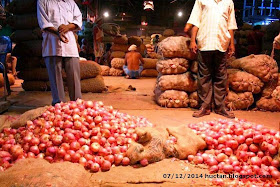7, 80年代, 馬新經營印度貨出入口商, 無人不識“CHIDAMBARAM”號客貨輪船。
這艘一萬七千噸級的海洋客貨輪船,每個月載約七百名旅客及大批貨物,川行檳城與馬德拉(Madras,
既是今天的Chennai) 港口。
只要見到“CHIDAMBARAM”靠岸瑞典咸碼頭(Sweetenham
Pier),就知道准有印度棉紡麻織品,南巴料,干冬薯,吉靈棗等等生貨雜糧,尤其是葱茨新貨上市啦。
葱茨的市場很廣闊,除了印度人外,是華人,馬來人和其他種族人廚房裡必不可少的調料。
檳城葱類的入口操於印度商之手,他們主要集中在所謂小印度的伯公街(King Street),皇后街(Queen Street), 義興街(Church
Street), 大街(China Street)﹔華人入口商居於次要地位。
當年輪船貨艙的散風系統還不很完善,葱茨易腐爛變質。而印度出口商在運船期間,往往不能對生貨變質施於有效的控制﹔
故沒有保險公司願意接保。
假如向印度源頭的代理商訂購,葱茨運抵檳後,發現腐爛得不可收拾,或是貨色不對辦,代理商均不負責賠償,那檳城的入口商就得虧大本。
咱們老店與成吉利寶號為鄰五,六十年,略知經營入口印度葱茨是一門高風險生意,在很大程度上是看“CHIDAMBARAM” 貨輪吃飯。
它在檳城港口碼頭卸貨時,曾發生一起意外事故。
事情原因印度港口工人,不理雨水滴濺入竹籮的洋葱,依然將貨卸進“CHIDAMBARAM”貨艙。經過一個星期的航程,庫存在船艙的洋葱,因潮濕而腐爛, 並且散發有害的毒氣。
進入船貨艙前,碼頭工人通常會放一隻活雞下去探毒氣,若拉上來的雞隻,仍是活生生的,那斷定貨艙空氣質量都沒有問題,
可以下去工作。
哪知是趟沒有做足探毒措施,幾個勞工冒然爬梯下艙,造成幾名工友中毒死亡。這是當年一段轟動的新聞。
1985年它在孟加拉灣航行途中突然起火,大火蔓延到旅客艙,有40多名旅客來不及逃生窒息死亡。不久,船隻就被賣掉拆廢了。
少了“CHIDAMBARAM”的航行,市場的印度貨出現短缺現象,也給檳城部分經營印度貨的商業活動陷入停頓狀態。可見輪船運輸業對有些貿易商有間接的影響。
論排名華人專營葱茨之首,非有“葱頭王”稱號的金源庄寶號莫屬。80年代在港仔口(Beach Street)與吉隆坡鵝嘜(Gombak),店門倉庫前,排列數十輛大型紅色車頭運貨卡車的陣容,風光一時,可惜後來竟做到關門大吉。
猶記比較著名的華營印度葱茨類入口批發商如下。
港仔口(Beach Street)還有榮源棧, 四海棧﹔中街的南美公司,成吉利,成和源,鼎豐寶號,德豐號,倪兩興有限公司,打鐵街的建興棧,振德盛有限公司,瑞興棧, 和海墘新路(Victoria
Street)已故江陳木裕老同學家族的三興公司。
可惜今天,百分之九十華商不能抵擋經濟的動蕩和變化,守不住市場。 前人入口印度葱類的商業活動,全被印度商攻佔了。
7, 80年代, 馬新經營印度貨出入口商, 無人不識“CHIDAMBARAM”號客貨輪船。
這艘一萬七千噸級的海洋客貨輪船,每個月載約七百名旅客及大批貨物,川行檳城與馬德拉(Madras,
既是今天的Chennai) 港口。
只要見到“CHIDAMBARAM”靠岸瑞典咸碼頭(Sweetenham
Pier),就知道准有印度棉紡麻織品,南巴料,干冬薯,吉靈棗等等生貨雜糧,尤其是葱茨新貨上市啦。
葱茨的市場很廣闊,除了印度人外,是華人,馬來人和其他種族人廚房裡必不可少的調料。
檳城葱類的入口操於印度商之手,他們主要集中在所謂小印度的伯公街(King Street),皇后街(Queen Street), 義興街(Church
Street), 大街(China Street)﹔華人入口商居於次要地位。
當年輪船貨艙的散風系統還不很完善,葱茨易腐爛變質。而印度出口商在運船期間,往往不能對生貨變質施於有效的控制﹔
故沒有保險公司願意接保。
假如向印度源頭的代理商訂購,葱茨運抵檳後,發現腐爛得不可收拾,或是貨色不對辦,代理商均不負責賠償,那檳城的入口商就得虧大本。
咱們老店與成吉利寶號為鄰五,六十年,略知經營入口印度葱茨是一門高風險生意,在很大程度上是看“CHIDAMBARAM” 貨輪吃飯。
它在檳城港口碼頭卸貨時,曾發生一起意外事故。
事情原因印度港口工人,不理雨水滴濺入竹籮的洋葱,依然將貨卸進“CHIDAMBARAM”貨艙。經過一個星期的航程,庫存在船艙的洋葱,因潮濕而腐爛, 並且散發有害的毒氣。
進入船貨艙前,碼頭工人通常會放一隻活雞下去探毒氣,若拉上來的雞隻,仍是活生生的,那斷定貨艙空氣質量都沒有問題,
可以下去工作。
哪知是趟沒有做足探毒措施,幾個勞工冒然爬梯下艙,造成幾名工友中毒死亡。這是當年一段轟動的新聞。
1985年它在孟加拉灣航行途中突然起火,大火蔓延到旅客艙,有40多名旅客來不及逃生窒息死亡。不久,船隻就被賣掉拆廢了。
少了“CHIDAMBARAM”的航行,市場的印度貨出現短缺現象,也給檳城部分經營印度貨的商業活動陷入停頓狀態。可見輪船運輸業對有些貿易商有間接的影響。
論排名華人專營葱茨之首,非有“葱頭王”稱號的金源庄寶號莫屬。80年代在港仔口(Beach Street)與吉隆坡鵝嘜(Gombak),店門倉庫前,排列數十輛大型紅色車頭運貨卡車的陣容,風光一時,可惜後來竟做到關門大吉。
猶記比較著名的華營印度葱茨類入口批發商如下。
港仔口(Beach Street)還有榮源棧, 四海棧﹔中街的南美公司,成吉利,成和源,鼎豐寶號,德豐號,倪兩興有限公司,打鐵街的建興棧,振德盛有限公司,瑞興棧, 和海墘新路(Victoria
Street)已故江陳木裕老同學家族的三興公司。
可惜今天,百分之九十華商不能抵擋經濟的動蕩和變化,守不住市場。 前人入口印度葱類的商業活動,全被印度商攻佔了。
In Malaysia and Singapore during the 70, 1980s, every importer and
exporter of products from India would definitely familiar with the merchant
ship "CHIDAMBARAM"
The
ocean-going vessel of 17,000 gross tons was carrying 700 passengers and a large
amount of general cargo sailing to and from the port of Penang and Madras (renamed
as Chennai in 1996) every month.
As long as one seen “CHIDAMBARAM” berthed alongside Sweetenham Pier, one would have known that Indian cotton textiles and woolen
fabrics, spice powder, potatoes, dates fruit and other cereals and coarse
grains; particularly the fresh picked onion have arrived for the sale market.
Onion
has a wide market. Besides consumed by Indian, it is also an essential
seasoning in the kitchen of Chinese, Malaya and other races.
The
India traders are known to dominate the market for the import and export
business of onion in Penang. They are centrally located in the so-called
Penang’s Little India around King Street, Queen Street, Church
Street, Market Street and China Street. Chinese traders are the second larger
importer of onion.
In the
past, the ventilation system in the cargo compartment did not worked well and
would cause the onion to decay easily and rapidly. As exporter in India cannot
provide effective control and care to ship the onion, thus no insurance company
were willing to hold cover for the shipment of onion.
If the
purchase of the onion was dealt by commercial agent and when the shipment
arrived in bad condition, the agent will not be responsible or liable for the decay
of onion. The
importers had to bear for the entire loss by themselves.
Learned
from our neighbor M/s Seng Hoe Guan, the importing and exporting business of
fresh produce like onion was considered high risk and volatile. To a great extend,
to make a profit or loss has been based on the condition of “CHIDAMBARAM”.
There was an accident occurred while unloading of onion from the
cargo compartment of “CHIDAMBARAM”.
In
spite of having rainfall, stevedores in India insist on loading package of
onion into the cargo hold. During the 7-days sail to
Penang from Madras, the damp condition in cargo compartment caused the entire onion
went rotten and emitted toxic gases.
Before entering the cargo compartment, stevedores would usually put down a live chicken for exploration of toxic gas. Should it be still alive
while pulling out, it was concluded that the air quality in the cargo hold was
free of toxic gas and safe for work.
But due to negligence in the detection
and prevention measure taken against toxic gas for that trip, several stevedores
were poisoned to death while entering the cargo compartment. That was the
breaking news of the past years.
In 1985, “CHIDAMBARAM” caught fire during the
voyage in Bay of Bengal and fire spread to passenger compartment. More than 40
passengers suffocated to death in the fire. The vessel was later sold for scrap.
On the absent of “CHIDAMBARAM”, a serious
shortage of daily products brought the market come to a standstill. Thus it
could be seen that any marine logistic disruption might cause indirect impact
to the general business activity
Among all Chinese importers of Indian onion, M/s Kim Guan Chng
should be classed as the biggest player in the top rank. In her glorious
period, there would be a lineup with a large fleet of heavy-duty trucked in
front of the office at Beach Street and ware-house at Gombak. It is a pity to
know that the company become insolvent and was later shutting down.
List of some popular Chinese
importers and wholesaler of Indian onion are as follow:
Eng
Guan Chan, See Hai Chan of Upper Beach Street, Lam Bee Company, Seng Hoe Guan,
Seng Keat Lee, Thean Hong & Co., Chop Teik Hong, Geh Leong Hin Sdn Bhd of
Middle Beach Street, Chop Kean Hin, Chin Teik Sheng Sdn Bhd, Swee Hin Chan at
the end of Beach Street and Sam Hin Sdn Bhd, a family business of our deceased
classmate, Kang Tan Bak Joo.
What a pity to say, 90% of
the Chinese importers could not resist the tough and economic
turbulence to hold the market. By now, the Indian importers and wholesalers not
only lead the market, but control it as well.



No comments:
Post a Comment